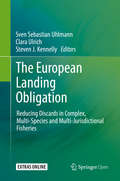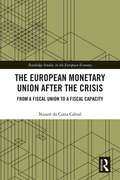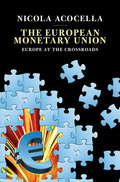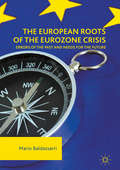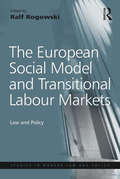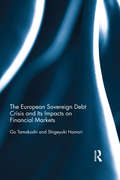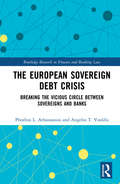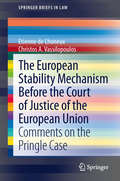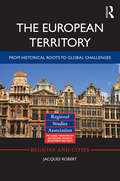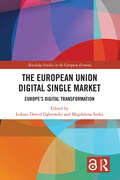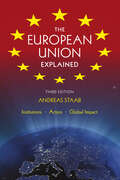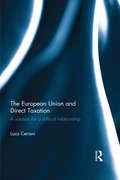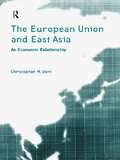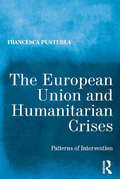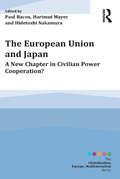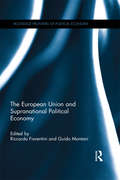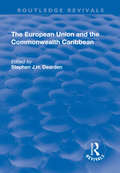- Table View
- List View
The European Landing Obligation: Reducing Discards in Complex, Multi-Species and Multi-Jurisdictional Fisheries
by Sven Sebastian Uhlmann Clara Ulrich Steven J. KennellyThis open access book provides a comprehensive examination of the European Landing Obligation policy from many relevant perspectives. It includes evaluations of its impacts at economical, socio-cultural, ecological and institutional levels. It also discusses the feasibility and benefits of several potential mitigation strategies. The book was timely published, exactly at the time where the Landing Obligation was planned to be fully implemented. This book is of significant interest to all stakeholders involved, but also to the general public of Europe and to other jurisdictions throughout the world that are also searching for ways to deal with by-catch and discard issues.
The European Model of Sport: Myth or Reality? (Routledge Research in Sport Business and Management)
by Borja García Vanja SmokvinaThis is the first book to present a critical analysis of the concept of the European Model of Sport (EMS). The EMS concept is widely used by policymakers at the national and EU levels, and by some sports organisations, yet it has never been comprehensively defined in official documents. This book asks whether the EMS is real or imagined, evaluates its significance in a rapidly evolving European context and for world sport more broadly, and compares it against other models of sport in different regions of the world. The first section of the book is a multi-disciplinary analysis of the EMS, putting the EMS in historical context and examining the concept from political, economic, socio-cultural and legal perspectives. The second section of this book looks at different models of sport within Europe, including Germany, the UK, Scandinavia and South-East Europe, and how they intersect with EU policy. The final section of this book looks at models of sport in North America, Latin America, China, Africa and the Arab World, highlighting key differences and similarities in order to illuminate our understanding of sport governance, policy and management around the world. Throughout, this book includes consideration of grassroots sport, going beyond traditional analyses that have focused primarily on professional sport. In an era in which sport represents a dynamic arena for competition between corporations, NGOs, international organisations and nation-states, this book is an essential reference for anybody with an interest in sport policy, sport governance, sport management, sport law, EU policy and law, the history of European integration or the relationship between sport and wider society.
The European Monetary System
by Peter Nyberg Horst Ungerer Owen EvensA report from the International Monetary Fund.
The European Monetary System in the Context of the Integration of European Financial Markets
by International Monetary FundIn 1979 the European Monetary System (EMS) was established to create a "zone of monetary stability" within the European Community (EC). This zone of stability was to be achieved by means of close monetary cooperation and coordinated exchange rate management.
The European Monetary System: Developments and Perspectives
by Augusto Lopez-Claros Horst Ungerer Jouko J. Hauvonen Thomas H. MayerA report from the International Monetary Fund.
The European Monetary System: Recent Developments
by Owen Evans Horst Ungerer Thomas Mayer Philip YoungThis study reviews developments in the European Monetary System from the beginning of 1983 to August 1986;it updates and complements an earlier study prepared by staff members of the International Monetary Fund and published Occasional Paper No. 19, which covered the time period from the inception of the European Monetary System to the end of 1982.
The European Monetary Union After the Crisis: From a Fiscal Union to Fiscal Capacity (Routledge Studies in the European Economy)
by Nazaré da Costa CabralThis book provides a much-needed detailed analysis of the evolution of Europe over the last decade, as well as a discussion about the path of reform that has been trodden in the aftermath of the financial crisis. It offers a multidisciplinary view of the E(M)U and captures the main factors that induced the reform of the monetary union – a process that has not been linear and is far from being concluded.The author examines the policy responses designed throughout the development of the crisis and assesses the scale of the crisis in Europe, in comparison to other parts of the world, as well as its prolonged effects both in economic and financial terms. An update on the current ‘state of the art’ in the conception of risk-sharing mechanisms is provided. With its innovative approach, the book analyses the financing issues which need to be taken into consideration in the design of these instruments and highlights the main categories of governmental risk-sharing mechanisms – in particular, the ones to be used as ‘fiscal capacity’.This is a timely and topical book and will be of interest to a broad audience, including experts, scholars and students of European affairs, particularly those with economic, financial, legal and political science backgrounds.
The European Monetary Union: Europe at the Crossroads
by Nicola AcocellaThe European Union is at a crossroads. This book analyzes the historical roots of the EU's monetary and financial institutions in order to better understand its struggle to maintain an economic and monetary union, as well as the ongoing problems facing the Euro. The institutions of the EU are based on the operation of free markets, a common monetary policy, and the European Central Bank. These founding policies have created many of the imbalances at the root of the ongoing European recession. Reemerging threats of populism and localism are poised to further disintegrate the European construction and may spark fierce opposition between countries. Acocella engages with these risks, suggesting detailed actions for reform within the EU and its institutions that may steer it away from further conflict, allowing it to better serve its member states and citizens.
The European Roots of the Eurozone Crisis
by Mario BaldassarriThis book examines the Eurozone crisis in light of theoretical and empirical evidence. The first half explores specific theoretical contributions within a framework of growth theory models to examine the two major pillars of the European construction, the European Central Bank and the Maastricht Treaty, and seeks to explain why they are theoretically wrong. The second half presents results of counterfactual simulations using the Oxford Econometric model and estimates what the Eurozone has lost in terms of economic and social cost from 2002 to 2014 as a consequence of the super-evaluation of the Euro and the Maastricht Treaty parameters being mistakenly fixed and pursued. Finally, the author supports the urgent need to refund the European Union, up-dating The Maastricht Treaty and the ECB statute to build three concentric circles: the USE (United States of Europe), the EU (European Union), the EAFTDA (Europe/Africa Free Trade and Development Area).
The European Social Model and Transitional Labour Markets: Law and Policy (Studies In Modern Law And Policy Ser.)
by Ralf RogowskiBringing together theoretical, empirical and comparative perspectives on the European Social Model (ESM) and transitional labour market policy, this volume contains theoretical accounts of the ESM and a discussion of policy implications for European social and employment policies that derive from research on transitional labour markets. It provides an economic as well as legal assessment of the European Employment Strategy and contains evaluations of new forms of governance both in European and member state policies, including discussions of the potential and limits of soft law instruments. Country studies of labour market reforms in Denmark, the Netherlands, Belgium and France assess their contribution to an emerging ESM, while comparative accounts of the ESM examine mobility and security patterns in Europe and beyond and evaluate recent 'flexicurity' policies from a global perspective.
The European Sovereign Debt Crisis and Its Impacts on Financial Markets
by Shigeyuki Hamori Go TamakoshiThe global financial crisis saw many Eurozone countries bearing excessive public debt. This led the government bond yields of some peripheral countries to rise sharply, resulting in the outbreak of the European sovereign debt crisis. The debt crisis is characterized by its immediate spread from Greece, the country of origin, to its neighbouring countries and the connection between the Eurozone banking sector and the public sector debt. Addressing these interesting features, this book sheds light on the impacts of the crisis on various financial markets in Europe. This book is among the first to conduct a thorough empirical analysis of the European sovereign debt crisis. It analyses, using advanced econometric methodologies, why the crisis escalated so prominently, having significant impacts on a wide range of financial markets, and was not just limited to government bond markets. The book also allows one to understand the consequences and the overall impact of such a debt crisis, enabling investors and policymakers to formulate diversification strategies, and create suitable regulatory frameworks.
The European Sovereign Debt Crisis: Breaking the Vicious Circle between Sovereigns and Banks (Routledge Research in Finance and Banking Law)
by Phoebus L. Athanassiou Angelos T. VouldisThe European Sovereign Debt Crisis: Breaking the Vicious Circle between Sovereigns and Banks explains why the euro area’s progress towards reining in the risks arising from the well-documented bi-directional financial contagion transmission mechanism that links sovereigns to commercial banks has been more prominent compared to the channel of contagion moving from banks to sovereigns. Providing an analysis of the legal and regulatory measures that Europe and the euro area have taken to mitigate the exposure of sovereigns to financial crises generated by commercial banks, this book draws attention to areas where improvements to the arsenal of tools hitherto introduced are either desirable or necessary. Chapters further explain – with recourse to economic and legal arguments – why the channel of contagion moving from sovereigns to commercial banks has proven harder to close, and explores ways in which progress could be made in the direction of closing it so as to avert the risk of future banking sector crises. This work provides essential reading for students, researchers and practitioners with an interest in sovereign debt crises and the euro-area banking system.
The European Stability Mechanism Before the Court of Justice of the European Union
by Etienne Lhoneux Christos A. VassilopoulosThis book provides an analysis of the judgment of the Court of Justice of the European Union in the Pringle case. It focuses on the three main aspects of the ruling. First, it examines the part of the judgment concerning the validity of the European Council Decision 2011/199 - adopted under the simplified revision procedure (Article 48(6) TEU) - which provides for the possibility to establish a financial stability mechanism. Second, it evaluates the new rules developed by the Court in order to interpret agreements concluded exclusively by the member states, such as the ESM Treaty. Third, it assesses the Court's interpretation of the main provisions of the so-called economic pillar of the Economic and Monetary Union and the fundamental rules provided for by the Treaties (nature of competence, financial assistance, institutional balance, judicial review charter of fundamental rights etc. ) with regard to the ESM treaty provisions.
The European Territory: From Historical Roots to Global Challenges (Regions and Cities #73)
by Jacques RobertOriginally published in French as Le territoire européen: des racines aux enjeux globaux, this book reflects the enormous changes that Europe has seen in the past half century. In a period of immense upheaval, the continent has experienced increased integration, largely through the development of the European Union, heightened urbanization and a changing rural landscape, while economic and commercial activities have impressed their stamp on the whole scene. In this book, Jacques Robert deploys the experience amassed throughout his 35 years’ experience as adviser to European institutions in the field of territorial and regional development. The chapter on cities explains the emergence of the European urban hierarchy and the driving forces and inertia behind its evolution, while a following chapter looks at the changing role of rural areas. This material provides a historic overview of relevant policies and a discussion of future challenges. The third chapter discusses evolving paradigms of regional economic development and their impact on European regions. Next, there is a chapter on the historical roots and current processes within territorial integration. The book concludes with an examination of Europe’s place in the world at large, focussing particularly on globalization effects, climate change and new energy paradigms, which will present real challenges for decades to come. The book is unique in its combination of in-depth analysis of the evolution of European territorial policies and paradigms, but also in its geographically comprehensive approach integrating the experience of both Western and Eastern Europe. It will be of interest to academics and professionals within territorial development and spatial planning.
The European Unfair Commercial Practices Directive: Impact, Enforcement Strategies and National Legal Systems (Markets and the Law)
by Amandine Garde Willem van BoomOne of the most important EU consumer protection directives of the past decade, the 2005 Unfair Commercial Practices Directive, or UCPD, is brought under examination in this stimulating volume. Bringing together leading experts in the comparative law and consumer law domain, the book discusses the impact of the Directive and whether the many possible issues identified at its inception have been borne out in practice. Divided into four parts of 'Implementation, Approximation and Harmonization', 'Vulnerability', 'The UCP Directive and Other Regimes', and finally 'Enforcement', the volume examines the various policy developments, the growing body of case law, the decisions of relevant national enforcement authorities, as well as the legislative debates which have surrounded the implementation of the UCPD in Member States. This book provides a valuable assessment of the impact of a major EU directive almost ten years after its adoption, and as such will be of interest to academics, legal practitioners and the judiciary working in the areas of European and Consumer law.
The European Union
by Ali M. El-AgraaThe European Union has established itself as a leading text that provides readers from all disciplines with a sound understanding of the economics and policies of the EU. Its wealth of information, detail and analysis has ensured that previous editions have been read by a generation of students, researchers and policy makers. It covers all major EU policy areas as well as theories of economic integration, the theory of economic and monetary union (EMU), the measurement of the economic effects of European integration and the legal dimension in EU integration. It also includes an explanation and analysis of all recent developments affecting the EU such as enlargement, the ratification of the Nice Treaty and the Convention for the Future of Europe. This edition has been thoroughly revised and updated and includes new resources to help students and teachers, including summaries, review questions, suggestions for essay titles and further reading lists.
The European Union Digital Single Market: Europe's Digital Transformation (Routledge Studies in the European Economy)
by Magdalena Suska Łukasz Dawid DąbrowskiAccording to the European Commission, two recent policies: the Digital Service Act and the Digital Market Act will allow for the regulation of a significant part of the EU Digital Single Market (DSM), to an extent similar to the creation of the traditional internal market in the early 1990s. The provisions are intended to improve conditions in the EU DSM to ensure that the market is as free and fair as it is safe for users of the digital economy. This interdisciplinary book analyses the impact of digital technologies on specific markets and, more broadly, the society and the economy. It identifies and assesses the different features, challenges, trends and dimensions of the EU DSM, from a legal and economic viewpoint, and also from a Polish perspective. Poland is presented as one of the EU countries participating in the creation of the EU DSM and is analysed alongside the average, as well as the best and the worst performing EU member states and compared with other non-EU members. The book addresses several broad areas in which the implications of digitalisation are particularly visible, and which are important to the "average" person: giant online platforms, freedom of speech, e-commerce, digital levy, energy infrastructure, and the labour market. The authors have presented opportunities and threats related to the functioning of the digital market. These opportunities and threats are typical of highly developed countries while reflecting the specific features of the EU DSM. The starting point of the considerations are the diverse experiences of the EU member states. The book adds a voice to the public debate on the role of the digital economy in the contemporary world and will be a useful guide for students and researchers in economics, law, and international relations.
The European Union Explained: Institutions, Actors, Global Impact
by Andreas StaabThis brief and accessible introduction to the European Union is ideal for anyone who needs a concise overview of the structure, history, and policies of the EU. This updated edition includes new chapters on the Eurozone financial crisis and background on the multiannual financial framework for 2014-20. Andreas Staab offers basic terms and interpretive frameworks for understanding the evolution of the EU; the overall structure, purpose, and mandate of its main constituent divisions; and key policy areas, such as market unification and environmental policy.
The European Union and Direct Taxation: A Solution for a Difficult Relationship
by Luca CerioniWithin the European Union, direct taxation is an area which often provokes controversy due to tensions between the tax sovereignty of the individual Member States and the desire for an integrated internal market. This book offers a critical review of the legislative and case-law developments in this area at the EU level, and reviews the European Commission’s proposed solutions in light of their concerns regarding the proper functioning of the EU’s internal market. Luca Cerioni set out a series of benchmarks determined from the objectives expressed by the European Commission, including: the elimination of double taxation and double non-taxation; the simplification of cross-border tax compliance; the reduction of abusive forum-shopping practices and general aggressive tax planning strategies; legal certainty for all businesses and individuals carrying on activities and receiving income in more than one EU Member State. Cerioni uses these benchmarks to ask which Directives and/or rulings have left legal uncertainty, and which have ended up creating or increasing the scope for aggressive tax planning. The book puts forward a comprehensive solution for a new optimal regime relating to tax residence, which would contribute to the EU project to the mutual benefit of Member States and taxpayers. As a thorough and critical discussion of EU tax rules in force, and of the European Court’s case law in direct taxation, this book will be of great use to academic researchers and students of EU law, tax practitioners, and policy-makers at the EU and national level.
The European Union and East Asia: An Economic Relationship
by Christopher M. DentThe world economy continues to be dominated by the Triad regions: Europe, North America and East Asia. This text analyses the economic relationship that has evolved between two Triadic powers: The EU and East Asia, and its future prospects, especially in the wake of the recent financial crises that have shaken the East Asian region.This text argues
The European Union and Humanitarian Crises: Patterns of Intervention
by Francesca PusterlaOver the last few decades international organisations, national governments, and governmental and private actors have all multiplied their efforts to limit the extent to which natural catastrophes, man-made atrocities and political and economic breakdowns affect civil populations. The European Union and Humanitarian Crises: Patterns of Intervention addresses the allocation of foreign aid within the framework of the European Union’s Humanitarian Aid policy and analyses different Member States’ intervention strategies designed to cope with these emergencies. Joining the debate about bilateral and multilateral allocation of foreign aid in crisis situations and exploring the cooperative actions undertaken by the European Union and its Member States to cope with them the book questions how the context of the crises themselves impacts on strategies of intervention and investigates how strategies change depending on the characteristics of the crisis.
The European Union and Japan: A New Chapter in Civilian Power Cooperation? (Globalisation, Europe, Multilateralism series)
by Paul Bacon Hartmut Mayer Hidetoshi NakamuraThe EU and Japan have one of the most important trade relationships in the world. Fittingly, this book presents a detailed analysis of their bilateral regulatory environment and negotiation processes. Moreover, the two polities have also co-operated extensively in bilateral and multilateral contexts on a range of global governance issues. Nevertheless, the relationship is widely acknowledged to have significant untapped potential. Deploying the concept of civilian power, the book takes a fresh, honest and provocative look at this important relationship, in a post-Fukushima, post-sovereign debt crisis world. First the book analyses the place of EU-Japan relations within the worldviews of the Japanese and European bodies politic. Subsequently, three thematic sections evaluate their cooperation on such issues as trade, energy security, environmental politics, development, human rights, post-conflict reconstruction, health and biosecurity. The eminent scholars of the EU-Japan relationship gathered in this book offer informed, empirically rich and policy-relevant insights into the present and future prospects for the relationship.
The European Union and Supranational Political Economy (Routledge Frontiers of Political Economy)
by Guido Montani Riccardo FiorentiniThe financial crisis – originated in 2008 in the United States – had a dramatic impact on the world economy. The European Union was immediately involved, but its reaction to the crisis was clearly inadequate. The misgovernment of the European economy not only put at risk the European Monetary Union, but it also caused further hindrances to the recovery of the global economy. The global financial turmoil shook deep-rooted beliefs. The doctrine of international neo-liberalism is more and more criticized. Nevertheless, the critics of neo-liberalism focus their attention on the relationship between the state and the market, as if the nation states, with their international organisations, have enough power for an effective global governance of the world economy. The model of European supranational integration, though seriously imperfect, can suggest some new way out from the crisis – even at the world level – based on a new relationship between the supranational government of the Union and the market. In this book, several academic disciplines are involved: international economics, international political economy, international law, international relations, political theory and democratic theory. Adopting such a multidisciplinary theoretical perspective, the volume tries to answer the following question: Is a more supranational Europe able to provide a better government of the EMU? Does this reform involve more European democracy?
The European Union and its Political Leaders: Understanding the Integration Process
by David Ramiro Troitiño Ricardo Martín de la Guardia Guillermo A. Pérez SánchezThis book focuses on the impact of political leaders on the integration process led by the European Union. It aims at a better understanding of the European Union through the actions, contributions, and ideas of these outstanding characters to European integration and disintegration. By doing so, the book offers an entirely new perspective, presenting the actions of the main actors involved, their background, their historical time, their challenges and problems, and how they influenced the European Union's development. The authors in detail discuss different ideas connected to leaders, such as Jean Monnet and neo-functionalism, Spinelli and federalism or Churchill and the idea of cooperation. Furthermore, the book examines major policies and events, like the Common Agricultural Policy, the creation of the Euro as a consequence of the German reunification and Mitterrand’s reactions, or Brexit and its connection to the impact of Margaret Thatcher. The global essence of the book makes it a must-read for students, researchers, and scholars interested in a better understanding of the European Union's integration process.
The European Union and the Commonwealth Caribbean (Routledge Revivals)
by Stephen J.H. DeardenThis title was first published in 2002: The Commodity Protocols of the EU have become a major focus of conflict with the USA. This illuminating volume reviews the significance of the banana, rum and sugar Protocols for the Commonwealth Caribbean, while placing them in the context of the Lomé and Cotonou Agreements. In an era of transition in the international trading environment, it provides an interesting case study of the implications for some of the smaller economic players in the world economy of these global changes. Timely and thought-provoking, this study will be of critical interest to students, academics and professionals in the field of development economics and European studies.
